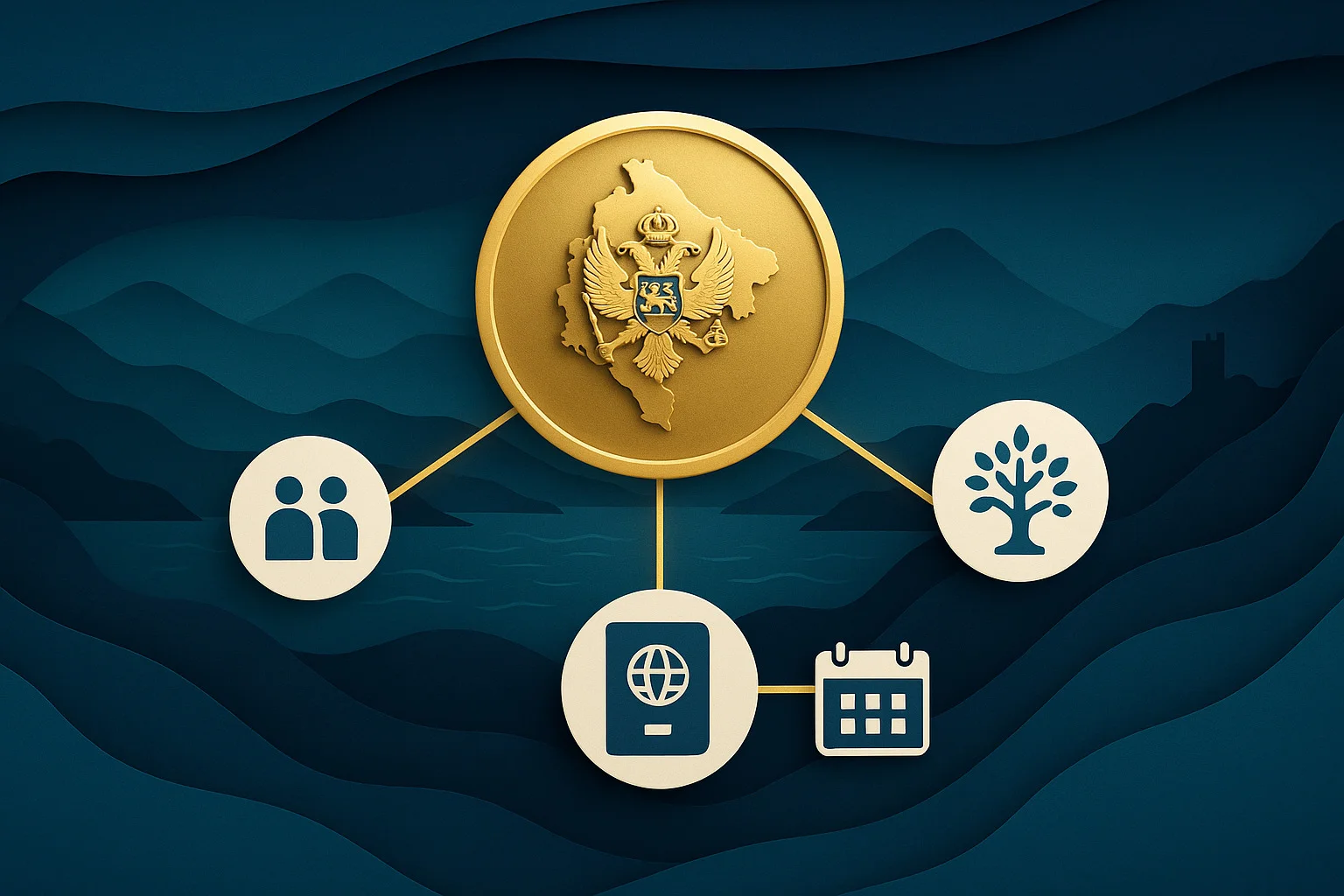Montenegro citizenship 2025 — naturalisation, marriage & descent explained
120
9/24/2025

Montenegro citizenship 2025 — naturalisation, marriage & descent explained
Applying for Montenegro citizenship in 2025 requires understanding the available routes: naturalisation after long-term residence, marriage or partnership with a Montenegrin citizen, descent from Montenegrin parents or grandparents, and reacquisition for former citizens. This guide explains eligibility, documents, timelines, and common mistakes, so you can build a strong file that meets Ministry of Interior requirements.
Key terms (Montenegro-specific)
- Državljanstvo: citizenship/nationality in Montenegrin law.
- Naturalizacija: naturalisation — citizenship after a period of residence, integration, and good conduct.
- Odricanje prethodnog državljanstva: renunciation of previous nationality, often required in standard naturalisation.
- Izvod iz matične knjige rođenih: long-form birth certificate, mandatory for most routes.
- Uvjerenje o nekažnjavanju: police clearance (certificate of no criminal record).
- MUP (Ministarstvo Unutrašnjih Poslova): Ministry of Interior, handling nationality applications.
Citizenship routes at a glance (2025)
| Route | Who it fits | Residence years | Key conditions | Main documents |
|---|---|---|---|---|
| Naturalisation | Foreign residents | 10 years (5 if married to Montenegrin) | Lawful stay, language/integration, good conduct | Residence history, police clearance, language proof |
| Marriage | Spouse of Montenegrin citizen | 5 years lawful residence | Proof of genuine marriage, continuous residence | Marriage certificate, joint-life proofs, residence permits |
| Descent | Children/grandchildren of Montenegrins | N/A | Parent/grandparent citizenship proof | Birth/marriage records of ancestors, registration |
| Reacquisition | Former Montenegrin citizens | N/A | Proof of prior citizenship | Historic registry extracts, police clearances |
Eligibility checklist (2025)
- Continuous residence: at least 10 years, or 5 years if married to a Montenegrin citizen.
- Good conduct: clean police records from Montenegro and other countries of residence.
- Integration: basic knowledge of Montenegrin language and society.
- Renunciation: in most cases, previous citizenship must be renounced unless exceptions apply.
- Route-specific proofs: marriage certificate, ancestry records, or evidence of prior citizenship.
Step-by-step process (2025)
- Confirm your route — naturalisation, marriage, descent, or reacquisition.
- Collect civil records — long-form birth certificate, marriage certificates, ancestry documents.
- Prepare residence evidence — copies of permits, registration certificates, address records.
- Obtain police clearances — from Montenegro and abroad; ensure legalisation/apostille.
- Renounce prior citizenship (if required) — provide certificate of renunciation.
- Submit application to MUP — include full dossier with translations and fee receipts.
- Attend interview — demonstrate integration and language basics.
- Decision & registration — once approved, complete registry entry and apply for passport.
Documents checklist
- Valid passport(s)
- Residence permits covering qualifying years
- Izvod iz matične knjige rođenih (long-form birth certificate)
- Marriage certificate (for spousal route)
- Ancestry records (for descent)
- Proof of renunciation of prior citizenship (unless exempted)
- Police clearance (Uvjerenje o nekažnjavanju)
- Proof of income, tax compliance, and integration
- Certified translations & apostilles
Costs & timeline
Government fees: application charges at MUP, translations, apostilles, police certificates. Timeline: naturalisation files can take many months; descent and reacquisition are usually faster if records are clear. Spousal cases depend on proof of residence and marriage authenticity.
What changed in 2025
- Closer checks on residence continuity — no long gaps between permits.
- Stricter review of renunciation documents for naturalisation cases.
- More emphasis on language/integration during interviews.
Common mistakes
- Incomplete residence records or gaps in renewals.
- Submitting foreign certificates without apostille/legalisation.
- Assuming marriage grants automatic citizenship.
- Weak ancestry proof in descent cases.
- Not renouncing previous citizenship where required.
Expert opinion
“The strongest Montenegro citizenship cases in 2025 show continuous residence, complete civil records, and clean renunciation documents. Most rejections stem from gaps in residence or missing legalisations.” — VelesClub Int. Immigration Team
FAQ
How many years for naturalisation?
Usually 10 years of continuous residence, or 5 if married to a Montenegrin citizen.
Does marriage grant citizenship directly?
No. You still need 5 years of lawful residence and proof of a genuine union.
Can I keep dual citizenship?
Normally renunciation is required, unless exempted by bilateral agreements or descent rules.
Is language required?
Yes, basic Montenegrin knowledge is assessed during interviews.
Can children apply by descent?
Yes, if at least one parent or grandparent was Montenegrin, with proper records.
Next steps
Planning your Montenegro citizenship dossier in 2025? Use our workspace and the Residency & Citizenship hub for tailored checklists, document templates, and step-by-step guidance.
Are there any questions or do you need advice?
Leave a request
Our expert will contact you to discuss tasks, choose solutions and be in touch at each stage of the transaction.
